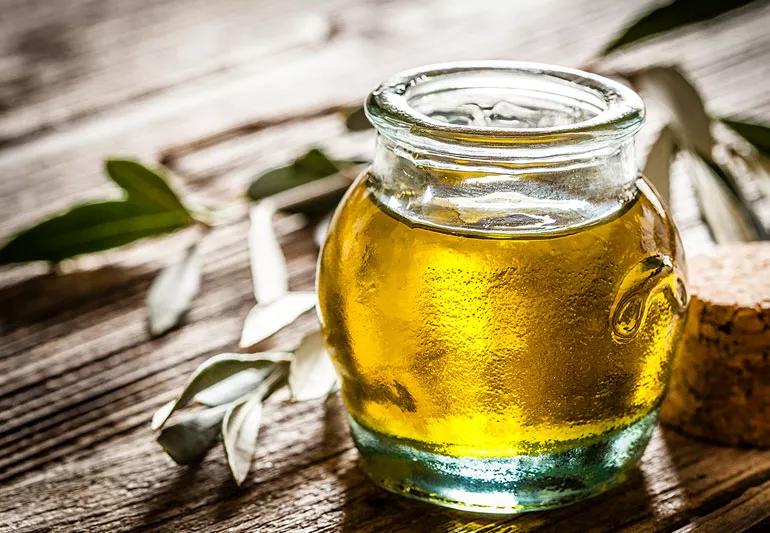Stay away from hand lotion and honey, but coconut oil can do the trick

Image content: This image is available to view online.
View image online (https://assets.clevelandclinic.org/transform/92115d43-8f8f-4d44-aa92-881f0744142b/olive-Oil-Small-Jar-1139661881-770x533-1_jpg)
Small jar of olive oil on a rustic wooden table.
There are a few reasons you might want a little more slip in your slide, down there. Perhaps you’re nearing menopause, and things are more parched than they used to be. Or maybe you just want to try something new and different with your partner.
Advertisement
Cleveland Clinic is a non-profit academic medical center. Advertising on our site helps support our mission. We do not endorse non-Cleveland Clinic products or services. Policy
You may be wondering about lubricant options beyond the usual drugstore brands. Some lube substitutes are definitely better for your sexy parts than others. And you might be surprised which ones make the cut.
Can you use lotion for lube? Probably not the greatest idea. Honey as lube, even though it may seem “natural,” also isn’t the way to go. Gynecologist Talia Crawford, MD, explains why and answers the question, “What can I use instead of lube?”
People use lubricants during sex for many reasons, says Dr. Crawford. It might be for fun, to ease vaginal dryness during menopause or to make anal sex more comfortable. Or you might want to use a novelty lube to increase sensation.
The typical lubes you find in drugstores fall into three categories:
But what if you want a natural lube or would rather use something you already have around the house? “You have a few good options, but there are also some things you definitely want to avoid,” says Dr. Crawford.
Advertisement
When it’s sexy time, don’t just reach for whatever’s nearby. The wrong lube can cause irritation, burning and even an infection. The best lube alternatives won’t irritate you or negatively impact vaginal health.
Here are some safe choices:
Several natural oils are acceptable sex lubricants. Dr. Crawford recommends (preferably organic) oils such as:
She also approves of vitamin E oil as a lube.
The oils Dr. Crawford recommends typically don’t cause vaginal irritation or lead to infection. And for anyone wanting a natural lube, these oils are good options.
However, don’t use oil-based lubes if you’re using a latex condom or dental dam. Oils break down latex, which, again, can lead to tears in the condom or dental dam.
If you’re not into olive oil as a lube or prefer something water-based, Dr. Crawford has a few suggestions.
First, look for a water-based lube that has aloe and vitamin E.
Then, check to make sure it doesn’tinclude chlorhexidine gluconate, nonoxynol-9 (or other spermicides), or propylene glycol. She also suggests steering clear of perfumed or scented lubes, as well as lubes that claim to have warming, cooling or tingling properties — it’s unlikely the ingredients involved are natural.
You can also use pure aloe vera gel. But you’ll likely find aloe dries out too quickly or doesn’t provide enough glide.
Dr. Crawford advises against using certain common products and substances for lube, especially during vaginal sex.
Here are the substances she says to avoid as sex lubricants:
Stay away from butter, egg whites, fish oil and yogurt. Animal proteins can disrupt healthy bacteria and lead to vaginal irritation and infection.
Shampoo and hand soaps have a basic pH. A vagina’s pH is naturally acidic. This mismatch can cause vaginal burning and, sometimes, infection.
Skin moisturizers often contain fragrances and other irritating ingredients. Plus, they tend to dry out too quickly if you try to use them as lube.
The bacteria in your mouth differ from those in your vagina. Introducing mouth bacteria down there can lead to an infection.
Stay away from sweeteners like agave, honey or syrup. Sugars can change the vaginal environment, creating an infection risk. They can also clump up and cause scratches.
Baby oil and petroleum jelly (Vaseline®) can irritate delicate tissues, especially in your vagina.
If you do use store-bought lubricants, check the back of the tube or box. Several common lube ingredients can give you unwelcome burning and irritation.
Advertisement
Dr. Crawford recommends avoiding these ingredients in your lubes:
Dr. Crawford also cautions against using lubes that claim to be “cooling” or “tingling.” The ingredients that produce these sensations can increase sensitivity during sex but may also irritate delicate areas.
It’s fine to play around with different types of lubes. Just stay away from the ingredients-to-avoid list. Beyond that — have fun!
Advertisement

Sign up for our Health Essentials emails for expert guidance on nutrition, fitness, sleep, skin care and more.
Learn more about our editorial process.
Advertisement
Turn to emergency birth control and STI tests
Most condoms will fit most people, but other factors matter, too
Yes, there is a condom that will fit
Mpox (monkeypox) is transmitted through skin-to-skin contact, including sex
Go for latex-free options if you experience sensitivity
‘Safer sex’ means STI prevention, avoiding unintended pregnancies and psychologically safe practices for everyone
It’s perfectly normal for gas pockets to ‘evacuate’ during the motions of sex
Popular myth says breastfeeding prevents pregnancy, but that’s not the whole story
Type 2 diabetes isn’t inevitable with these dietary changes
Applying a hot or cold compress can help with pain
Pump up your iron intake with foods like tuna, tofu and turkey